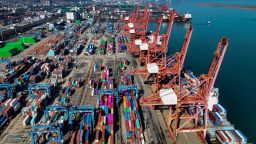China has vowed to resolutely defend its interests in the face of huge new US tariffs and warned that the trade barriers would affect the wider relationship between the two economic superpowers.
President Joe Biden on Tuesday announced that tariffs on $18 billion worth of imports of Chinese electric vehicles and an array of other products would soar over the next two years.
The White House said the measures were designed to protect American workers and businesses in the face of China’s unfair trade practices, including “flooding global markets with artificially low-priced exports.”
China “firmly opposes” the new tariffs, the country’s Commerce Ministry said in a statement.
“The increase in … tariffs by the United States contradicts President Joe Biden’s commitment to ‘not seek to suppress and contain China’s development’ and ‘not to seek to decouple and break links with China,’” it said. “This action will seriously impact the atmosphere of bilateral cooperation.”
EVs imported from China will see their tariffs more than quadrupled from 27.5% to 100% — a policy lever meant to challenge Beijing’s practice of encouraging aggressively low pricing by domestic EV manufacturers while levying a 40% tariff on US car imports.
In addition to EVs, increased tariffs will apply to imports of Chinese steel and aluminum, legacy semiconductors, battery components, critical minerals, solar cells, cranes and medical products.
Tariffs on solar cells and semiconductors will double to 50%, while the remainder of the targeted imports will attract tariffs of 25%.
“China opposes the unilateral imposition of tariffs which violate (World Trade Organization) rules, and will take all necessary actions to protect its legitimate rights,” Chinese foreign ministry spokesperson Wang Wenbin told reporters Tuesday shortly before the widely anticipated White House announcement.
The Commerce Ministry said China would take resolute measures to defend its rights and interests and urged the Biden administration to “correct its wrongdoing.”
China’s global trade surplus in goods has soared in recent years and is now approaching $1 trillion, stoking tensions with the United States and Europe.
The Biden administration and European Union officials fear Beijing is trying to tackle a subsidy-fueled overcapacity problem in its decelerating economy by dumping excess products on global markets. Leaders from the Group of Seven developed economies will discuss how to protect their industries at a summit next month.
Responding to a separate question during the briefing, Wang added that the growth of China’s new energy industry — including EVs, lithium batteries and photovoltaic products — is built on “continued technical innovation, complete industrial and supply chains, and full-on market competition.”
“Our leading edge is a result of comparative advantage and the rule of markets combined, not (of) subsidies,” Wang said.
This story has been updated with additional information.
Shawn Deng contributed to this article.










